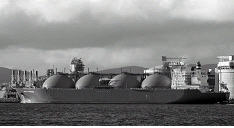
In this age of soaring fuel prices, Liquified Natural Gas is being proposed by some as either a relatively inexpensive alternative to fossil fuels, or a necessary "bridge technology" between dirty oil and coal and a more biofuel, wind and solar energy future.
In fact, here in Oregon, our usually environmentally friendly Democratic Governor Ted Kulongoski, is in favor of LNG. That puts him squarely opposed to our Democratic Secretary of State, Bill Bradbury-who despises LNG.
The issue is in focs this week, as proposals by the Feds and the State of Oregon to build three LMG terminals and four LNG pipelines are seriously being debated. In fact, the anti-LNG terminal crowd made their feelings known yesterday during a rally at the Oregon State House in Salem.
While most would admit that domestic natural gas is a relatively safe fuel, liquified LNG carries several risks. It is carbon-producing, and via its necessary importation from Russia, Nigeria, Indonesia and the Middle East, introduces several other risks-some scientific, some natural, some security-based.
An excellent article on Page 4 of The Folded Crane- the Winter 2008 issue of the Oregon Physicians for Social Responsibility, pinpoints six key objections to LNG:
LNG's not clean. LNG's supercooling and transit requirement constitute a sizeable negative carbon footprint.
LNG can undermine competing alternative energy initiatives.
LNG can hurt fragile ecosystems. Dredging necessary for pipelines and terminals can harm rivers, tributaries, and the life within them.
LNG constitutes a security risk. Whether an accident or not, an explosion of an LNG tanker can create an explosion with a fireball at least three miles wide. That would not be OK.
LNG leaks are polluting, odorless, and cannot be detected.
LNG terminals construction would likely call for economically distructive eminent domain seizure and acquisition of privately held land.
I'm not a particularly astute expert on LNG, but everything I've heard about LNG terminals or pipelines makes the whole issue a non-starter for me.
For you?